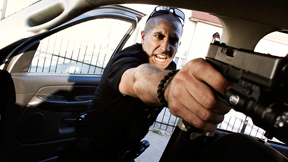There is a phrase often used by script analysts called the “white moment.” It is the crest of the dramatic arc, that brief moment where everything appears to be going well for our hero before a dramatic reversal of fortune. Cop dramas are rife with moments such as this, and cliche dictates that the senior officer two days from retirement must inevitably meet his demise.
The white moment is especially relevant to “End of Watch,” a film whose heroes, Officers Brian Taylor (Jake Gyllenhaal) and Mike Zavala (Michael Peña), spend its entire runtime unconsciously competing to see who will have their white moment first. It’s an unintentionally entertaining element, but also one that adds notable unpredictability to a film that is equally gripping and utterly ineffectual.
Taylor and Zavala are cocky street cops in a notoriously dangerous precinct of Los Angeles. They’re distinct for their unorthodox approach to things: Zavala has an off-the-books brawl with an African-American suspect early in the film, and the pair is all about car chases, gunfights and general shenanigans. This lands them into trouble when they inadvertently hit a string of cartel operations, a move that puts them right in the sights of the cartoonish Big Evil (Maurice Compte).
There are certain elements of “End of Watch” that simply don’t work, and most of them are cosmetic concerns. The film starts off trying to sell itself as a found-footage film, a conceit it abandons in an opening car chase that cuts to angles that no handheld camera could reasonably capture. “End of Watch” continues veering back and forth between found-footage cinematography and a traditionally cinematic style throughout. It also posits itself as a realistic take on the harshness of the streets of LA, but its African-American gangsters are unequivocally good-hearted softies and its Latinos are cartoonish monsters whose dialogue is nothing but a barrage of street profanity.
However, the foundation of the film is the relationship between Taylor and Zavala. Peña and Gyllenhaal are both strong, consistent performers, and their chemistry together is charming. There is an unforced intimacy to the scenes of them cruising the streets, and Gyllenhaal in particular is as relaxed and effective here as he’s been in years. Zavala has a longtime wife, and Peña makes sure every audience member knows how much he loves her. Throughout the course of the film, Taylor meets and marries a young woman played by Anna Kendrick, and Kendrick is a lovely presence, even if her character barely qualifies as anything but Taylor’s motivation to not get killed in the film’s finale.
That finale, by the way, is the film’s most problematic element. Director David Ayer loads “End of Watch” with suspenseful moments, and his handling of the street violence inherent to being an LAPD officer is often visceral and intense. Every time Taylor and Zavala talk about how wonderful their lives are and how they’d take care of each other’s families if one of them was to die, it’s clear that one of them is building to their white moment. “End of Watch’s” finale is a taut and unnerving climax to the story that seems to throw the audience’s expectations back in their face with unexpected savagery.
And then it backs off. Without delving into too much detail, the final scenes of “End of Watch” are a disappointment, an abrupt turn upwards out of a nose dive for our heroes. Sure, blood is spilled, but the gravity and horror you’re feeling one moment completely dissipates in the next, leaving “End of Watch” with a muddled thesis and a denouement that’s utterly purposeless. Nonetheless, “End of Watch” is an often-entertaining cop drama and an interesting exploration of male camaraderie, and a toothless ending is no reason not to watch.
Printed on Monday, September 17, 2012 as: Cop film explores camaraderie





















